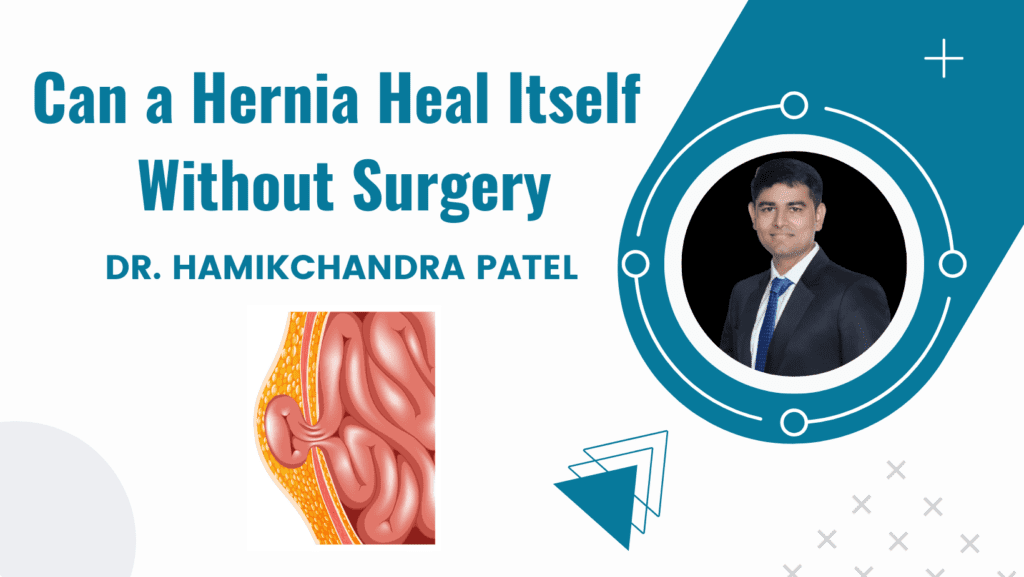Can a Hernia Heal Itself Without Surgery ?

What is Hernia?
Whether a hernia can heal itself without surgery, Firstly it's essential to understand hernias. Hernia is a common medical condition that can affect people of all ages and backgrounds. It occurs when an organ or fatty tissue pushes through a weak spot or opening in the surrounding muscle or connective tissue. Hernias can develop in various areas of the body, in some of the most common types
inguinal hernias (in the groin area), hiatal hernias (in the upper stomach), and umbilical hernias (around the belly button).
One question that often arises when discussing hernias is whether they can heal on their own without the need for surgery. In this blog post, we will explore this topic in-depth, examining the factors that influence hernia healing and the role of surgery in the treatment process.
Understanding Hernias
it's essential to understand how hernias develop and their underlying causes. Hernias occur when there is a weakness or opening in the abdominal wall, allowing the contents of the abdomen to protrude through. The most common causes of hernias include:
- Muscle Weakness: When the muscles in the abdominal wall are weakened due to aging, injury, or other factors, they become less effective at holding the internal organs in place. This weakness can create an opening through which a hernia can form.
- Increased Intra-Abdominal Pressure: Activities that increase intra-abdominal pressure, such as heavy lifting, chronic coughing, or straining during bowel movements, can contribute to the development of hernias.
- Congenital Factors: In some cases, hernias are present at birth (congenital) and are the result of incomplete closure of the abdominal wall during fetal development. These hernias may not be noticeable until later in life when the abdominal muscles become weakened.
Hernia Can Heal Itself?
Hernias typically do not heal without intervention. Hernias are structural defects in the abdominal wall, and the opening or weakness that allows tissue to protrude through does not tend to spontaneously close. In other words, hernias do not have the ability to heal themselves in the same way that minor cuts or bruises can heal over time.
Hernias may remain stable for a while, causing minimal discomfort or inconvenience. However, they rarely improve without medical attention. Without proper treatment, hernias are more likely to worsen over time, potentially leading to complications such as bowel obstruction, strangulation, or increased pain and discomfort.
Factors That Influence Hernia Healing
While hernias themselves do not typically heal on their own, several factors can affect the progression and management of a hernia. These factors include:
- Size of the Hernia: Smaller hernias are less likely to cause severe symptoms and complications. In some cases, a small hernia may not require immediate surgery and can be managed with lifestyle modifications and monitoring.
- Type of Hernia: The type of hernia also plays a significant role in determining the course of treatment. For example, hiatal hernias, which occur in the upper stomach, may be managed differently than inguinal or umbilical hernias.
- Symptoms and Discomfort: The presence of symptoms such as pain, discomfort, or difficulty with daily activities can influence the decision to pursue surgery or other treatments.
- Patient's Overall Health: The patient's age, general health, and underlying medical conditions can impact the suitability of surgical intervention. Some individuals with certain health issues may not be good candidates for surgery and may explore non-surgical options.
Non-Surgical Management of Hernias

While hernias typically do not heal on their own, there are non-surgical approaches to manage them. These approaches may be suitable for certain individuals, especially those with small hernias or underlying health concerns that make surgery a less desirable option. Non-surgical management may include:
- Watchful Waiting: In cases of small, asymptomatic hernias, doctors may adopt a "watchful waiting" approach. This involves monitoring the hernia's size and any symptoms while making lifestyle modifications to reduce the risk of complications.
- Lifestyle Changes: Lifestyle modifications can help reduce the risk of hernia-related symptoms and complications. These changes may include avoiding heavy lifting, maintaining a healthy body weight, and managing conditions such as chronic coughing or constipation.
- Supportive Garments: Some individuals may find relief from hernia symptoms by wearing supportive garments or trusses. These devices provide external support to the hernia and may help reduce discomfort.
- Medications: In some cases, medications can be prescribed to manage symptoms associated with hernias, such as pain or reflux in the case of hiatal hernias.
- Physical Therapy: Physical therapy exercises may be recommended to strengthen the surrounding muscles and improve posture, which can provide some relief for certain types of hernias.
It's important to note that non-surgical management is not a cure for hernias but rather a way to manage symptoms and reduce the risk of complications. Surgical intervention remains the most effective method for repairing a hernia and preventing its progression.
The Role of Surgery in Hernia Treatment
Surgery is the most common and effective treatment for hernias. The primary goal of hernia surgery is to repair the structural defect in the abdominal wall, thus preventing the protrusion of organs or tissue. Surgery offers several benefits in hernia treatment:
- Permanent Repair: Hernia surgery aims to provide a permanent solution by closing the weakened or torn tissue and reinforcing the abdominal wall. This reduces the risk of recurrence.
- Symptom Relief: Surgery can alleviate hernia-related symptoms, such as pain, discomfort, and difficulty with physical activities.
- Prevention of Complications: Hernias can lead to severe complications if left untreated. Surgery can prevent these complications, including bowel obstruction and strangulation, which can be life-threatening.
- Improved Quality of Life: After successful hernia surgery, patients often experience an improved quality of life, with the ability to resume regular activities without discomfort.
Types of Hernia Surgery
There are different surgical approaches to repairing hernias, and the choice of procedure depends on factors such as the type of hernia, its size, and the patient's overall health. Some common types of hernia surgery include:
- Open Hernia Repair: In open hernia repair, a surgeon makes an incision near the hernia site and manually pushes the protruding tissue back into place. The weakened tissue or muscle is then repaired and reinforced with stitches or a mesh.
- Laparoscopic Hernia Repair: Laparoscopic or minimally invasive hernia repair involves making several small incisions and using specialized instruments and a camera to perform the surgery. This approach typically results in less scarring and a quicker recovery.
- Robotic Hernia Repair: Similar to laparoscopic surgery, robotic hernia repair is a minimally invasive procedure that uses robotic-assisted technology for greater precision and control.
Recovery After Hernia Surgery

The recovery period following hernia surgery varies depending on the type of procedure, the patient's overall health, and the size of the hernia. In general, most patients can expect the following during their recovery:
- Pain and discomfort for a few days after surgery, which can be managed with pain medications prescribed by the surgeon.
- Restrictions on lifting and physical activity for several weeks to allow the surgical site to heal properly.
- Gradual resumption of regular activities under the guidance of the surgeon.
- Follow-up appointments with the surgeon to monitor healing and address any concerns.
It's essential to follow the surgeon's post-operative instructions carefully to ensure a smooth recovery and reduce the risk of complications.
Conclusion
If you suspect you have a hernia or are experiencing symptoms such as pain, discomfort, or bulging, it is essential to seek medical evaluation and consultation with a healthcare professional. They can assess your condition, discuss the most appropriate treatment options, and help you make an informed decision about your hernia management.
Dr. Hamikchandra Patel is surgical gastroenterologist of Shaleen multi-speciality hospital in Ahmedabad is Known for its commitment for providing highest quality of care for patients who undergo hernia surgery.
Hamik surgical outcomes are higher than the national average, while complication rates remain much lower. As Experienced gastro surgeon in Ahmedabad, he has performed hundreds of minimally invasive hernia surgeries each year. He is know for his low complication rates, with less than once percent returning to the operating room. Book your appointment today with DR. Hamikchandra patel
Remember that early intervention and timely surgical repair can prevent complications and improve your overall quality of life. Book your appointment with DR. Hamikchandra patel for personalized guidance.
Have any Doubts or Concerns about Hernia Surgery?
Consult Us

 While hernias typically do not heal on their own, there are non-surgical approaches to manage them. These approaches may be suitable for certain individuals, especially those with small hernias or underlying health concerns that make surgery a less desirable option. Non-surgical management may include:
While hernias typically do not heal on their own, there are non-surgical approaches to manage them. These approaches may be suitable for certain individuals, especially those with small hernias or underlying health concerns that make surgery a less desirable option. Non-surgical management may include:
 The recovery period following hernia surgery varies depending on the type of procedure, the patient's overall health, and the size of the hernia. In general, most patients can expect the following during their recovery:
The recovery period following hernia surgery varies depending on the type of procedure, the patient's overall health, and the size of the hernia. In general, most patients can expect the following during their recovery:

